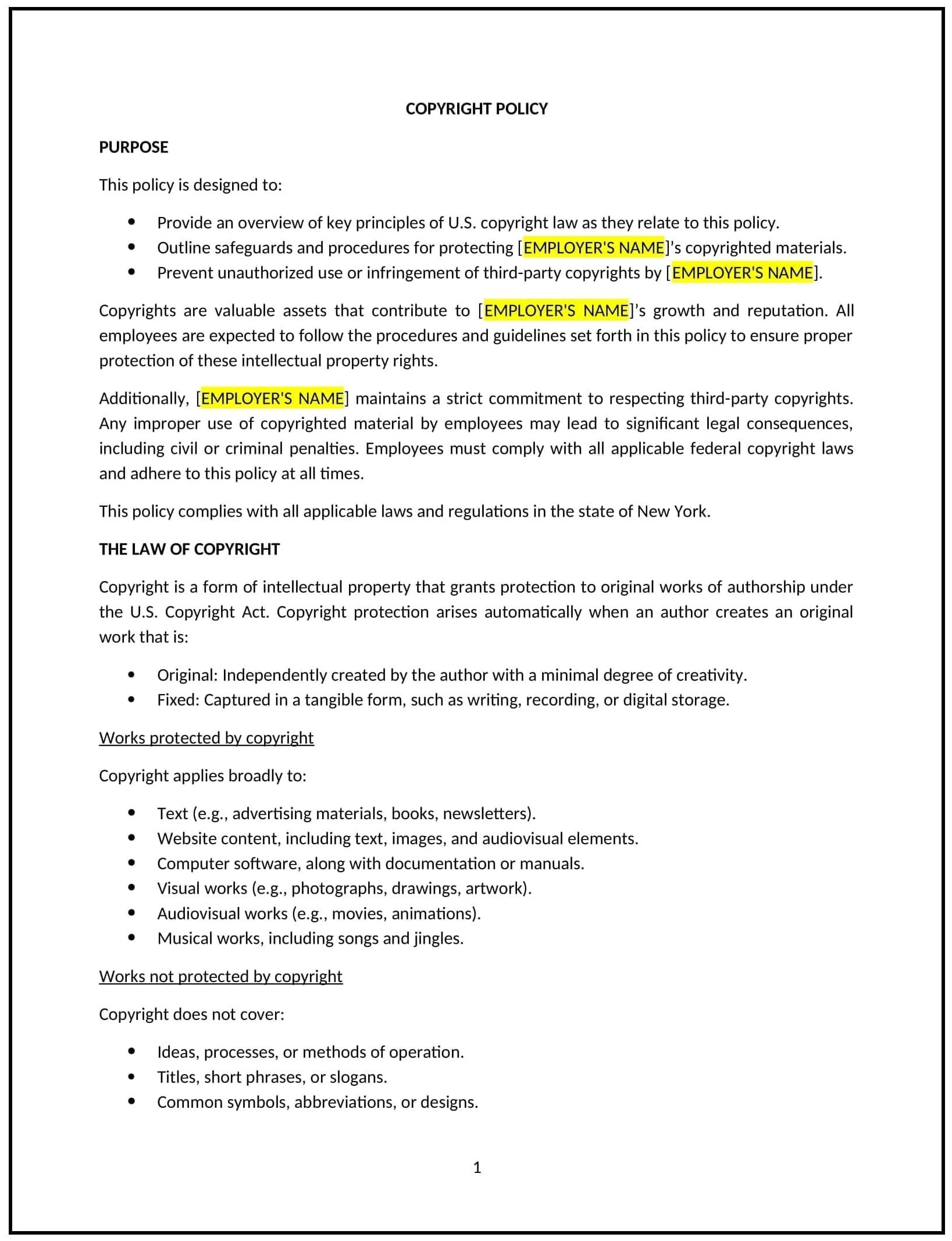Got contracts to review? While you're here for policies, let Cobrief make contract review effortless—start your free review now.

Customize this template for free
Copyright policy (New York)
A copyright policy helps New York businesses protect their intellectual property by outlining the company's approach to copyright law, including how copyrighted materials should be used, stored, and distributed. This policy defines what constitutes copyrighted material, the process for obtaining licenses or permissions, and the responsibilities of employees and contractors regarding copyrighted works. It also covers how the business handles any instances of copyright infringement and how it complies with New York and federal copyright laws.
By implementing this policy, businesses can safeguard their creative works, reduce the risk of copyright violations, and maintain compliance with applicable copyright laws.
How to use this copyright policy (New York)
- Define copyrighted materials: Clearly outline what constitutes copyrighted materials within the business, including written works, software, designs, images, music, and any other creative content. Specify the importance of respecting copyright laws and avoiding unauthorized use of third-party works.
- Outline procedures for using copyrighted materials: Specify the process for obtaining proper licenses or permissions to use copyrighted works. This includes how employees should request authorization to use third-party materials and how the company handles licensing agreements.
- Address fair use: Include a section on fair use, explaining how employees can determine when it is appropriate to use copyrighted works without permission under the fair use doctrine, such as for commentary, research, or education, and the limitations on such use.
- Establish procedures for reporting and addressing infringements: Create a process for reporting any suspected copyright infringements, whether committed by the business or others. The policy should outline how the business handles infringement claims and how employees should report potential issues.
- Provide guidelines for creating original content: Outline expectations for employees regarding the creation of original content, including respecting third-party intellectual property and ensuring that new work produced by employees is properly assigned and protected.
- Define consequences for policy violations: Clearly define the disciplinary actions that will be taken if employees or contractors violate the copyright policy. This may include corrective measures, training, or, in severe cases, termination.
- Comply with New York and federal laws: Ensure the policy complies with both New York state and federal copyright laws, including the Digital Millennium Copyright Act (DMCA) and other relevant regulations.
Benefits of using this copyright policy (New York)
This policy offers several benefits for New York businesses:
- Reduces legal risks: By clearly outlining the proper use of copyrighted materials, businesses can minimize the risk of costly legal disputes or copyright infringement claims.
- Protects intellectual property: The policy helps businesses safeguard their own copyrighted works and intellectual property, ensuring that employees understand the importance of respecting company-owned content.
- Promotes compliance with laws: The policy helps businesses stay compliant with copyright laws, reducing the risk of fines, penalties, and legal issues that could arise from accidental infringements.
- Supports creative freedom: With clear guidelines in place, employees can confidently create original works knowing how to protect their intellectual property and respect others’ rights.
- Enhances reputation: A business with a strong copyright policy demonstrates professionalism and ethical standards, which enhances its reputation in the industry and with clients.
Tips for using this copyright policy (New York)
- Communicate the policy clearly: Make sure all employees, contractors, and stakeholders understand the importance of copyright law and how the policy applies to their work. Include it in employee handbooks, training sessions, and onboarding materials.
- Provide regular training: Offer ongoing education to employees about copyright laws, the use of copyrighted materials, and best practices for creating and using original content. This helps reduce the risk of accidental infringement.
- Monitor for potential infringements: Regularly monitor content and materials used by the business to ensure that employees are following copyright guidelines. Be proactive in addressing any potential issues.
- Use licensed or public domain materials: Encourage employees to use properly licensed or public domain materials to avoid the risks associated with using copyrighted works without permission. Provide access to licensed resources where possible.
- Review and update the policy regularly: Periodically review the copyright policy to ensure it is compliant with the latest copyright laws, business practices, and industry standards. Update the policy as needed to reflect any changes in the law.